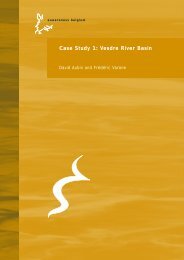Case Study 1: Matarraña River Basin - Euwareness
Case Study 1: Matarraña River Basin - Euwareness
Case Study 1: Matarraña River Basin - Euwareness
You also want an ePaper? Increase the reach of your titles
YUMPU automatically turns print PDFs into web optimized ePapers that Google loves.
Meanwhile, meetings held between the Administration and the users from the high and<br />
the middle and lower basin could not reach any agreement. As a matter of fact, each<br />
part looked for support to their claims in different arenas. Actors at higher basin could<br />
mobilise the support of the some experts of the University of Aragón, important regional<br />
environmental organisations (Fundación Ecología y Desarrollo and COAGRET) and of<br />
some municipalities of the Aragon Pyreness and others from the regions of Catalonia<br />
and Valencia. The Central Union, which mostly represents the interests of the middle<br />
and lower basin, looked for the support of the regional government and started an<br />
information campaign in the rest of the municipalities of the river basin in order to<br />
explain their scarcity problems and their reasons to support the pumping project.<br />
Neighbours of the high basin kept organising several demonstrations and some of<br />
them started a hunger strike. Besides, in December 1997 they organised the first<br />
Seminar on the <strong>Matarraña</strong> river basin: 15 university professors (from the University of<br />
Zaragoza and Barcelona) took part in the event and concluded that the construction of<br />
the Torre del Compte dam was not viable and that the modernisation of the irrigation<br />
system in the <strong>Matarraña</strong> river basin was required in order to rationalise water demands.<br />
Before the ending of the year, a slight dialogue channel between actors located at the<br />
higher and the middle-lower basin, without the participation of the Administration or<br />
other intermediaries, seemed to be opened. Although both coalitions had some points<br />
in common —they all agree in accusing the central administration and the CHE of<br />
having been unable to find an efficient solution to the scarcity problems of the basin—,<br />
an agreement on a suitable solution was still not reached.<br />
In 1998 a serious drought period would not only modify the definition of the water<br />
problem but also the position of some of the actors in the policy network, resulting in a<br />
new and more favourable context for negotiation. Along this year the territorial conflict<br />
within the <strong>Matarraña</strong> river basin was coincident with a national environmental and<br />
social movement against the construction of more dams and diversion projects<br />
promoted by the central administration. At the beginning of 1998 PALDEMA was<br />
created. It took the decision of having no more demonstrations for the moment.<br />
Meanwhile, the claim for a large regulation project in the middle and lower basin<br />
strengthened: several representatives of water uses of the <strong>Matarraña</strong> river basin<br />
(irrigation farmers, representatives of farm organisations and some municipalities)<br />
showed their support to the construction of the Torre del Compte dam, as they<br />
considered it as being the best solution for granting water supply for all uses. Such<br />
52



